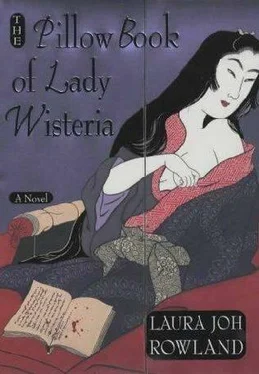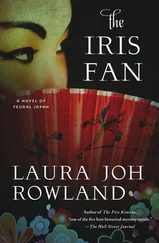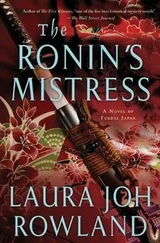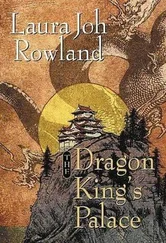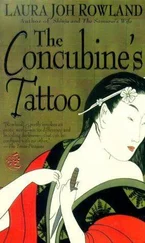Sano nodded; he and his men bowed, conceding defeat.
“His Excellency won’t be pleased to hear that you’ve wasted so much time on me, instead of pursuing his heir’s killer,” Nitta said with sardonic pleasure. “But just to show you that I bear no hard feelings toward you, I shall give you a bit of advice. If you’re looking for a likely culprit, you might consider a hokan named Fujio.”
A hokan was a male entertainer who sang and played music for guests in Yoshiwara and for wealthy nobles and merchants around Edo. “Why should I?” Sano said.
“Fujio was a client of Lady Wisteria when she first became a courtesan. His love for her is the subject of his most popular songs. But when Wisteria rose to the rank of taju, she rejected him in favor of samurai clients. This made Fujio very angry at her, and jealous of her new lovers, who included Lord Mitsuyoshi.”
The treasury minister spoke in a tone heavy with significance, as if to make sure Sano understood that Fujio had reason for killing Mitsuyoshi and Wisteria. However, it was obvious to Sano that Nitta sought to divert suspicion from himself by implicating the hokan.
“Fujio performed at the party in the Owariya,” Nitta continued. “He could have slipped into the bedchamber, stabbed Lord Mitsuyoshi, and abducted Lady Wisteria.”
Yet perhaps Nitta had killed Lord Mitsuyoshi himself, and now wished to destroy another man who’d enjoyed the favors of his courtesan.
“Thank you for the information,” Sano said, keeping his expression neutral. Though he didn’t trust Nitta, he desperately needed leads. He intended to pay Fujio a visit, whatever Nitta’s motive for casting suspicion on the hokan.
As Sano rode down the street with his men, a clatter of hoofbeats caused him to look backward. He saw Police Commissioner Hoshina and a squadron of troops arriving outside Treasury Minister Nitta’s gate.
The Saru-waka-cho theater district had been selected as the location of the miai.
Hirata and his father, wearing their best silk robes and finest swords, walked up the street with Segoshi, a palace guard captain whom Sano had engaged as a substitute go-between. Behind them followed two family retainers, Hirata’s mother, and her maid.
The district sparkled with life in the bright, clear weather. Theater buildings sported colorful banners that announced the current plays. Bursts of song and applause emanated from windows. In towers on the roofs, men beat drums to attract customers. People jammed the teahouses or queued at ticket booths, lugging quilts to keep them warm during the performances that lasted all day. Fragrant smoke wafted from outdoor braziers where vendors roasted chestnuts. But Hirata and his party walked in somber quiet. As they neared their destination, anxiety clenched his stomach tighter and tighter.
They stepped aside to let a wedding procession pass. A palanquin carried the bride in her white kimono. Friends, relatives, and lantern-bearers accompanied the palanquin.
“What an auspicious sign for the day of a miai,” said Captain Segoshi. A good-natured older samurai, he obviously wanted to lighten the mood of his companions.
“As far as I’m concerned, the sight of a wedding procession is a bad-luck omen,” Hirata’s father said in a grumpy tone. He walked with a severe limp, caused by an accident that had necessitated his retirement from the police force. “I attend this miai against my wishes, and I’d rather turn around and go home before we take a step we’ll regret.”
“But everything has been arranged,” Hirata said, alarmed by his father’s attitude. “Backing out now would be a terrible breach of courtesy. And you won’t regret beginning my marriage negotiations. Midori-san is a good, honorable match for me, for our family.”
This was but another argument in the dispute which had begun three months ago, when Hirata had told his parents that he wished to marry Midori and asked their permission. They opposed the idea, and had only consented to the miai because the formal request had come from Sano, whom they couldn’t refuse.
Disapproval darkened the broad, lined face of Hirata’s sire. “Honorable matches can only occur between families of similar tradition, and that’s not the case here. We are hatamoto-hereditary Tokugawa vassals. Lord Niu is an outside daimyo. His clan didn’t swear allegiance to the Tokugawa until after it was defeated at the Battle of Sekigahara.”
“That battle ended almost a hundred years ago,” Hirata said. “Ever since then, the Niu have been loyal subjects of the Tokugawa, just like us. Can’t we forget the past?”
“Tradition is too important to forget.” His father’s voice sharpened with reproach. “It’s the mainstay of our society. And surely the Niu clan desires this alliance no more than I do. If you marry this girl, you’ll never really be accepted by her kin, nor she by ours.”
Hirata glanced backward at his mother. Small though sturdy, dressed modestly in gray, she gave him a smile that said she sympathized with him, but agreed with her husband. Captain Segoshi looked embarrassed to be caught in a family dispute.
“Why can’t you be satisfied to marry into one of the suitable families who’ve offered their daughters to you?” Hirata’s father said.
When Hirata had left his lowly position as a doshin and become chief retainer to the sōsakan-sama, his status in the marriage market had soared. His family began aspiring to a better match for him than they could have expected before his promotion. After Hirata gained a place in the shogun’s inner circle, proposals from high-ranking clans had inundated Hirata and his parents. They’d attended many miai, but Hirata had spurned all the fine young ladies introduced to him.
“Niu Midori is the woman I want to marry,” he said now. “I love her. She loves me.”
His father gave a disgusted snort. “Love is unimportant in choosing a bride. Social position and duty to your family are what really matter. If you marry a woman who’s right for you, then the two of you will learn to love each other after the wedding, as your mother and I did.” He halted in the street. “I can’t approve of this match, even though the sōsakan-sama does. You should marry someone I choose for you, because you’re unable to choose wisely for yourself.”
Hirata’s mother bowed her head, silently seconding her husband’s words. Desperation forced Hirata to employ the one argument that could aid his cause.
“I respect your opinion, Honorable Father,” he said, “but I must remind you that my marriage to Niu Midori would solve a big problem for us.”
That problem was their chronic shortage of money. Hirata had elderly, ailing grandparents, two widowed sisters with small children, and many destitute relatives, as well as longtime retainers and servants to support. Unfortunately, Hirata’s father earned little by teaching martial arts to police officers. Hirata contributed as much to his family as he could, but even his generous stipend didn’t go far enough. He needed to make a financially advantageous marriage, and he’d hoped that this need would convince his parents to allow him to wed Midori.
Although the Niu clan had been subjugated and stripped of its ancestral fief after the Battle of Sekigahara, it remained one of Japan ’s most powerful families. The first Tokugawa shogun had realized that unless he pacified his conquered foes, they might later rebel. He’d granted the Niu a fief in Satsuma, and the right to rule that entire province. Lord Niu Masamune, the current daimyo, possessed huge wealth, and whoever married a daughter of his would gain a valuable dowry.
Now Hirata’s father glowered at the knowledge that he needed this match he repudiated. “That’s the only reason I’ll even consider a marriage between you and this girl,” he said, resuming his awkward, limping pace down the street.
Читать дальше
